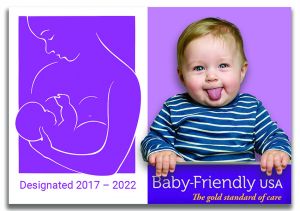July 31, 2018
July 31, 2018
World Breastfeeding Week Highlights Benefits for Infants and Parents
August 1-7 marks “World Breastfeeding Week,” a week that brings attention to a topic near and dear to everyone on the women’s health team at Cooley Dickinson Health Care.

After years of research and implementation at the Childbirth Center, Cooley Dickinson became one of over 500 U.S. hospitals—and only the second facility in western Mass.—designated as “baby-friendly.” One of the key elements of the Baby-Friendly designation is to highlight the many benefits of breastfeeding, as well as to support endeavors to increase the percentage of people who choose to breastfeed.
Rates of breastfeeding significantly decreased in the U.S. in the 1950s, and there has been a major push in the last 20 years to reassert the practice as the dominant form of infant feeding. Research has demonstrated that exclusive breastfeeding for at least the first six months after birth has many benefits for both infants and parents.
Benefits of Breastfeeding
In the immediate postpartum period, as babies are transitioning to life outside the uterus, being skin-to-skin with a parent can help with temperature regulation, breathing, and bonding. Such contact leads to hormone cascades that support and encourage the breastfeeding cycle. Breast milk contains an optimal balance of nutrients for new babies, as well as powerful antibodies to help them fight off infections. Children who are/were breastfed have a decreased risk of sudden infant death syndrome (SIDS) and childhood illnesses like cancer, diabetes, and asthma. Parents who breastfeed have a decreased risk of breast and ovarian cancer, osteoporosis, and anemia, in addition to the benefits of bonding and developing a relationship with the baby.
UNICEF and WHO (the World Health Organization) launched the “baby-friendly initiative” to educate and support parents about breastfeeding from the baby’s earliest moments. Baby-Friendly USA is the national organization that accredits hospitals, and Cooley Dickinson Hospital was designated as baby-friendly earlier this year.
The general philosophy is comprised of three ideas: 1) breast milk is the optimal way for babies to receive nourishment and nutrients, 2) hospitals and birth centers should encourage all feeding options without the influence of commercial interests, and 3) every parent should be informed of the benefits of breastfeeding and allowed to make their own decision. Grounded by this philosophy, the baby-friendly initiative has “Ten Steps to Successful Breastfeeding” that hospitals with this designation follow. These include training all relevant staff in breastfeeding techniques, helping parents to initiate breastfeeding within the first hour of life, and providing information and support so parents can make their own decision about breastfeeding or not.
The benefits of breastfeeding have been clearly demonstrated, and parents should be educated on the practice and encouraged to consider it. However, it is important to acknowledge that breastfeeding is a learned behavior on both the parent and infant’s part, and it can be very challenging at first. Many parents benefit from immediate and continued support, as contrary to widespread opinion, the function does not always “come naturally.”
Associated Pain

Once parents leave the hospital with a new baby, new challenges can come up, and continued access to various resources may be welcome. One of the most commonly cited reasons for discontinuing breastfeeding is nipple pain; while some degree of transitory pain is normal for newly breastfeeding parents, long-lasting pain or cracked and bleeding nipples can be a sign of poor latch or incorrect positioning. The baby’s body should face the parent during feeding, with their ears, shoulders, and hips in alignment and the mouth in line with the breast. A properly latched baby should have their tongue down and lips flanged around much of the areola, and there should be rhythmic sucking and audible swallowing. If pain persists, the nipples can be soothed by soaked tea bags, warm water compresses, and expressed breast milk.
In some cases, nipple pain can be a sign of infection that needs treatment by a midwife or doctor. Breastfeeding parents should be on the lookout for shooting nipple pain accompanied by itching or burning during or right after feeding. The nipples may be persistently cracked and red, and the areola may appear shiny and peeling.
How Much is Enough?
Many new parents are concerned that their baby is not receiving enough breast milk, and this is another common reason for discontinuing breastfeeding. When thinking of babies’ needs in the early post-partum period, it is helpful to remember the size of their stomachs. On day one, it is the size of a marble and increases to the size of a walnut on day 3, a plum after a week, and an egg after a month. Because their stomachs are so small, babies need to eat frequently. Breast milk is a supply-and-demand system: the more a baby breastfeeds, the more milk is produced, and babies don’t overeat breast milk. It can be hard at first to understand a baby’s cues, and sometimes fussiness, crying, and wakefulness can be mistaken for signs that the baby is still hungry when those might just be part of normal behavior. Instead of using “infant satisfaction” as a way to gauge whether babies are getting enough milk, relying more on the number of wet or soiled diapers and weight gain are more accurate. Women’s health care providers are happy to discuss this concern with parents and should be consulted before initiating any supplements or medications.
Breastfeeding can be challenging for both new and experienced parents and doesn’t work for everyone. Cooley Dickinson lactation consultants are available for classes, one-on-one instruction, and group support, and there are many other options in the Valley as well. La Leche League, Breastfeeding USA, and the Nursing Mothers’ Council all have local meetings; many health centers have lactation support; and there are numerous private practice lactation consultants.
Devon Riley, CNM, is a certified nurse midwife at Cooley Dickinson Medical Group Women’s Health.

